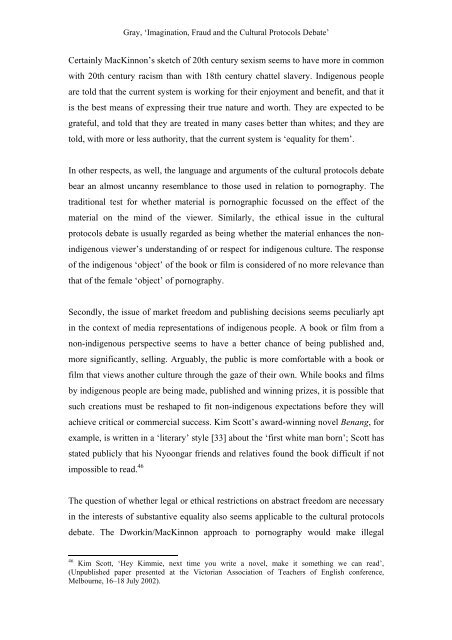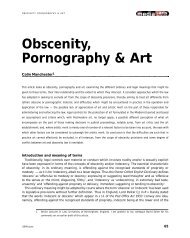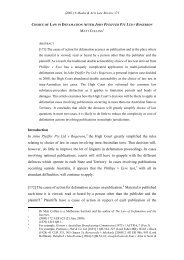Recent controversy over Phillip Gwynne's book Deadly, Unna? and ...
Recent controversy over Phillip Gwynne's book Deadly, Unna? and ...
Recent controversy over Phillip Gwynne's book Deadly, Unna? and ...
Create successful ePaper yourself
Turn your PDF publications into a flip-book with our unique Google optimized e-Paper software.
Gray, ‘Imagination, Fraud <strong>and</strong> the Cultural Protocols Debate’<br />
Certainly MacKinnon’s sketch of 20th century sexism seems to have more in common<br />
with 20th century racism than with 18th century chattel slavery. Indigenous people<br />
are told that the current system is working for their enjoyment <strong>and</strong> benefit, <strong>and</strong> that it<br />
is the best means of expressing their true nature <strong>and</strong> worth. They are expected to be<br />
grateful, <strong>and</strong> told that they are treated in many cases better than whites; <strong>and</strong> they are<br />
told, with more or less authority, that the current system is ‘equality for them’.<br />
In other respects, as well, the language <strong>and</strong> arguments of the cultural protocols debate<br />
bear an almost uncanny resemblance to those used in relation to pornography. The<br />
traditional test for whether material is pornographic focussed on the effect of the<br />
material on the mind of the viewer. Similarly, the ethical issue in the cultural<br />
protocols debate is usually regarded as being whether the material enhances the nonindigenous<br />
viewer’s underst<strong>and</strong>ing of or respect for indigenous culture. The response<br />
of the indigenous ‘object’ of the <strong>book</strong> or film is considered of no more relevance than<br />
that of the female ‘object’ of pornography.<br />
Secondly, the issue of market freedom <strong>and</strong> publishing decisions seems peculiarly apt<br />
in the context of media representations of indigenous people. A <strong>book</strong> or film from a<br />
non-indigenous perspective seems to have a better chance of being published <strong>and</strong>,<br />
more significantly, selling. Arguably, the public is more comfortable with a <strong>book</strong> or<br />
film that views another culture through the gaze of their own. While <strong>book</strong>s <strong>and</strong> films<br />
by indigenous people are being made, published <strong>and</strong> winning prizes, it is possible that<br />
such creations must be reshaped to fit non-indigenous expectations before they will<br />
achieve critical or commercial success. Kim Scott’s award-winning novel Benang, for<br />
example, is written in a ‘literary’ style [33] about the ‘first white man born’; Scott has<br />
stated publicly that his Nyoongar friends <strong>and</strong> relatives found the <strong>book</strong> difficult if not<br />
impossible to read. 46<br />
The question of whether legal or ethical restrictions on abstract freedom are necessary<br />
in the interests of substantive equality also seems applicable to the cultural protocols<br />
debate. The Dworkin/MacKinnon approach to pornography would make illegal<br />
46 Kim Scott, ‘Hey Kimmie, next time you write a novel, make it something we can read’,<br />
(Unpublished paper presented at the Victorian Association of Teachers of English conference,<br />
Melbourne, 16–18 July 2002).



![ERIN O'DWYER [92] Introduction Striking a balance between ...](https://img.yumpu.com/14667367/1/184x260/erin-odwyer-92-introduction-striking-a-balance-between-.jpg?quality=85)


